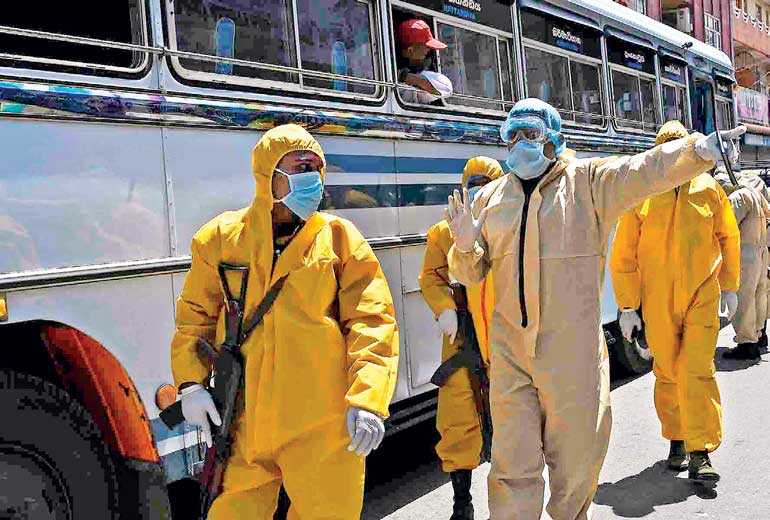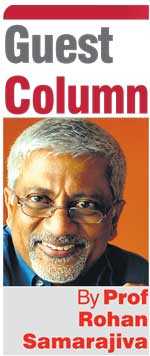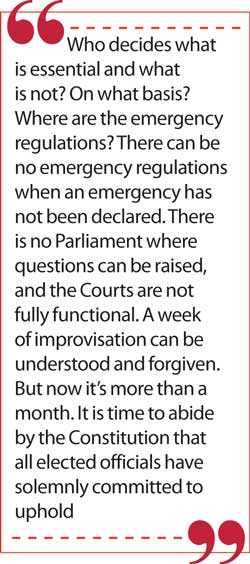Wednesday Feb 18, 2026
Wednesday Feb 18, 2026
Tuesday, 28 April 2020 00:00 - - {{hitsCtrl.values.hits}}

When the State acts in ways that result in life-changing impacts on citizens (the curfew in this instance, but could also be allowing infected individuals to clear the airport), there must be accountability. There must be evidence that decisions were taken on the best available information and with best efforts made to minimise harms to citizens – Pic by Shehan Gunasekara
Imagine a day in the life of a daily wage earner, before COVID-19. Of a woman who makes her living by providing cleaning services to several houses in Colombo.
She was free to take public transport, and on occasion a three-wheeler to get to work. She was free to take up or decline work and negotiate rates and days. She was free to keep cash, put some money in a bank and withdraw when needed. She could choose the vendors from whom she purchased groceries and other items. 
It was no walk in the park. The work was hard, the madams were not always nice, the buses crowded… But she was able to feed her family and live her life. She could make small donations and participate in a seettu. She was not dependent on handouts or charity. She had liberty.
Now imagine her post-COVID-19 life. The money has run out, the jewellery is in the pawn shop. She cannot work, she cannot earn. April is burning hot, and her family is cooped up in a tiny tenement. Even when she has money, she cannot choose: she must buy whatever is offered at whatever price by whoever comes down the lane. She has to rely on handouts from the Government and from others. It used to be like this after the floods, but then one knew the water would recede and normalcy would return.
The curfew was supposed to be just for the weekend when first imposed. Now it has been over a month. Dates are announced and then changed for reasons unexplained. No one knows when this will end.
Will she be welcome in the houses she used to clean? Will they fear her as carrier of disease and do their own cleaning? Will there be other work? She sees the streets are still being swept. Who should she talk to, how much is the bribe?
This is what the loss of liberty is for daily wage earners, for those whose work requires co-presence, those most affected by the curfew. The freedom to earn a living, to traverse public thoroughfares, to choose from whom to buy and what, to have some peace with the children out playing. All taken away by distant politicians and officials whose earnings are certain, who have no worries about food on the table when they are driven home by a chauffeur after a drink at the Hilton with a friend.
Let us concede that the lockdown (or its more severe version, the curfew) was needed to prevent the health system from being overwhelmed.
To save the lives of the elderly and those with weakened immunity. To buy time to get the tests and the acute-care beds and the PPE [personal protective equipment] organised.
The curfew was State action with significant positive externalities for society. Everyone benefited, including the daily wagers and the politicians. But the costs were not borne evenly. Those with the curfew passes and the Government vehicles may have borne none. Those among them who exercised discretionary authority may have even benefited.
The child who could not celebrate a birthday bore some of the costs. The executive who could not maintain the jet-black head of hair did too. But their costs were nothing compared to the daily wager cooped up in a tiny tenement without money to buy food and no certainty about what next week and next month would bring. 
Giving these people money is not charity. It is compensation for the harm done to them by the State that dwarfed the benefits they received. It has been common practice to provide compensate when the State takes away assets or livelihoods. That is what has been done by the curfew.
When the State acts in ways that result in life-changing impacts on citizens (the curfew in this instance, but could also be allowing infected individuals to clear the airport), there must be accountability. There must be evidence that decisions were taken on the best available information and with best efforts made to minimise harms to citizens.
For this, two things are needed. The decisions must be taken under some written law and must be documented. There must be independent entities such as the Courts and the Legislature in place to examine the way the decisions were taken and with the power to hold the Executive to account. Do these conditions exist now?
The Acting IGP makes all sorts of announcements and arrests are made. But what laws are being broken by persons using public roads? What laws made by our elected representatives require shops to be closed?
Who decides what is essential and what is not? On what basis? Where are the emergency regulations? There can be no emergency regulations when an emergency has not been declared. There is no Parliament where questions can be raised, and the Courts are not fully functional.
A week of improvisation can be understood and forgiven. But now it’s more than a month.
It is time to abide by the Constitution that all elected officials have solemnly committed to uphold. Perhaps we should consider requiring the unelected decision makers to also take an oath of office, so they are reminded we live under law.